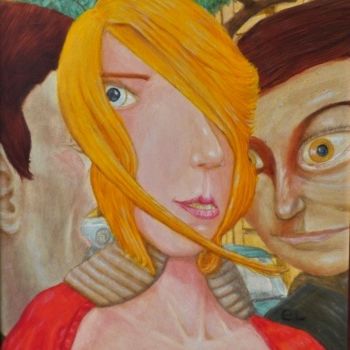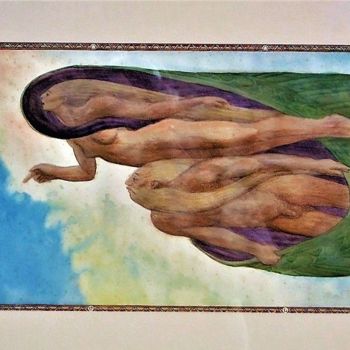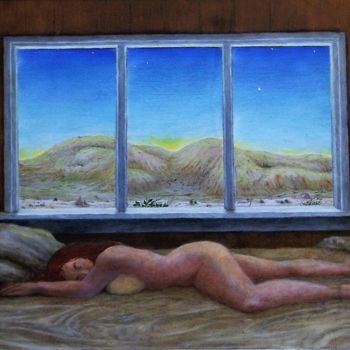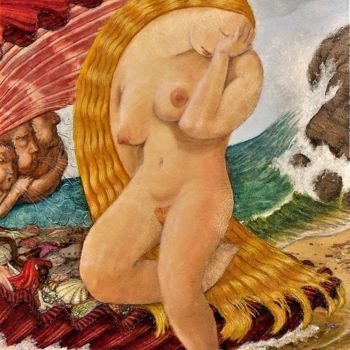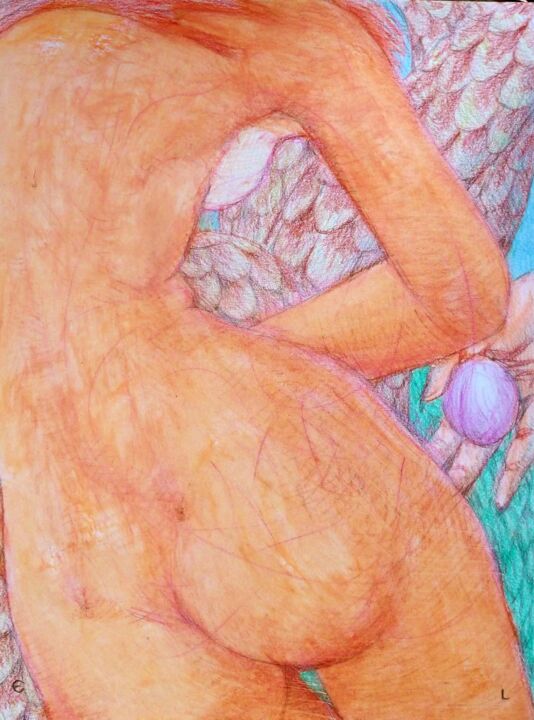


Let us know if you would like to see more photos of this artwork!
- Back of the work / Side of the work
- Details / Signature / Artwork's surface or texture
- Artwork in situation, Other...
The Temptation of Eve 2 (2017) Drawing by Edwin Loftus
More info
- Packaging (Box or cardboard packaging) All artworks are shipped with a premium carrier, carefully protected and insured.
- Tracking Order tracking until the parcel is delivered to the buyer. A tracking number will be provided so that you can follow the parcel in real-time.
- Delay Worldwide delivery in 3 to 7 days (Estimate)
More info
- Trackable Online Certificate of Authenticity Authenticity Certificates can be verified online at any moment by scanning the artwork code.
- Artist Value Certification Experts study the work and career of an artist then establish an independent and reliable average price value. The average price value situates the artist on a price range for a given period. The experts may also be asked to establish a more precise estimate for a particular work.
More info
100% secure payment with SSL certificate + 3D Secure.
More info
This image is available for download with a licence
Sold by Edwin Loftus
-
Original Artwork (One Of A Kind)
Drawing,
Pastel
on Paper
-
Dimensions
15x12 in
Dimensions of the work alone, without framing: Height 12in, Width 9in - Framing This artwork is framed (Frame + Under Glass)
- Categories Drawings under $1,000 Conceptual Art World Culture
It also celebrates the cute curves and angles common in the youthful bodies of females.
And it symbolically associates this event with the Yin and Yang symbol recognized in various Asian philosophies/religions.
Both of these symbols involve the interplay of dualities in the nature of existence, (or how we think about and experience existence. The Yin and Yang concept and symbol is relatively analogous. Two unlike qualities engage in a constant interplay, displacing each other, while both being elements of the same whole.
In Western tradition the concept of dialectics does not have so clear a symbol, and has become involved in the qualitative issue of Good and Evil in which the dominance of Good over Evil is perceived as the only satisfactory outcome.
The issues around Right and Wrong and how to determine what is which, has been the overriding issue throughout the history of civilization, is the overriding issue today, and appears likely to remain the overriding issue in all future to come.
Among theists, Right and Wrong are usually spelled out in the theology to which they adhere. But this is very less significant among Polytheistic systems and atheistic beliefs. Nonetheless, societies in which these dominate also aspire to establishing universally applicable concept of Right and Wrong, based on election of some deities over others as they effect one's life or, in atheism, the effort to determine a consensus in human opinion about what is Right and Wrong and whether that applies universally.
Jesus is quoted warning against being one of those who, "... can see the mote in another's eye, but cannot see the beam in their own eye." Right and Wrong tends to be relative to the circumstances of each human being and humans tend to be less sympathetic to the conditions of others than to their own conditions.
It would be beneficial to the idea of civilization for each individual to determine what they think is Right and Wrong, but only if they can apply the Kantian concepts of "The Limitations of Self Awareness,' and, 'The Prolegomena to All Future Morality."
Still more important, (perhaps), would be if every human being determined the Epistemologist's challenge; "What do I know and how do I know it?"
This would be important and everyone capable of reading this has already worked through the issues once, during infancy when they were rudely introduced to an objective environment. But few can remember that process of discovery and their formulation of assumptions about the nature and dynamics of reality, because those issues were pondered in a very different system of thinking based on experiential comparisons rather than linguistic symbolism.
This would be important and valuable to us all, but, realistically, few are ever likely to attempt it. Descartes attempted it in his famous; "I think, therefore I am. I can doubt that I am. But I cannot doubt it without thinking." He was applying what is known as an "apriori" test of knowing, (It cannot be doubted without demonstrating its validity).
Put simply; To find a universal sense of Right and Wrong, we would need to have a universally accepted idea of what reality is. But that can't happen if we can't even determine what our own sense of reality is. And that can't happen if we can't determine what our current sense of reality is built upon.
It's quite a conundrum. And to bring this full-circle, remember that the fruit the serpent is offering to Eve is the Fruit of the Tree of the Knowledge of Good and Evil, (or Right and Wrong, if you prefer).
Related themes
Edwin Loftus is an American painter and draftsman born in 1951. His interest in art began at the age of 4 when he decided to draw something real rather than working from his imagination.
As a child he excelled at drawing and as a teenager he began to experiment with oil painting. In college, he took courses in art and art history and realized that true art had nothing to do with the quality of the drawing or painting, but that it had to have the ambition to push the boundaries and expand the visual experience.
He also studied philosophy, psychology and history and quickly realized that it was just another art establishment trying to defend its elitist industry and reward system. Their skills were almost non-existent, they knew nothing about psychology, perception or stimulus response, and they were extensions of the belief system that made communism, fascism and other forms of totalitarianism such destructive forces in the world. They literally believe that art shouldn't be available to ordinary human beings, but only to an elite "sophisticated" enough to understand it.
Edwin Loftus realized that the emperors of art had no clothes, but they were still the emperors. Gifted in art, he worked hard to acquire this skill. So he found other ways to make a living and sold a few artworks from time to time. For sixty years, many people enjoyed his works and some collected them.
Today, Edwin Loftus is retired. Even if he sold all his paintings for the price he asked, "artist" would be the lowest paid job he ever had... but that's the way it is. It won't matter to him after he dies. He just hopes that some people will like what he does enough to enjoy it in the future.
-
Nationality:
UNITED STATES

- Date of birth : 1951
- Artistic domains: Works by artists with a certified artist value,
- Groups: Certified Artists Contemporary American Artists




